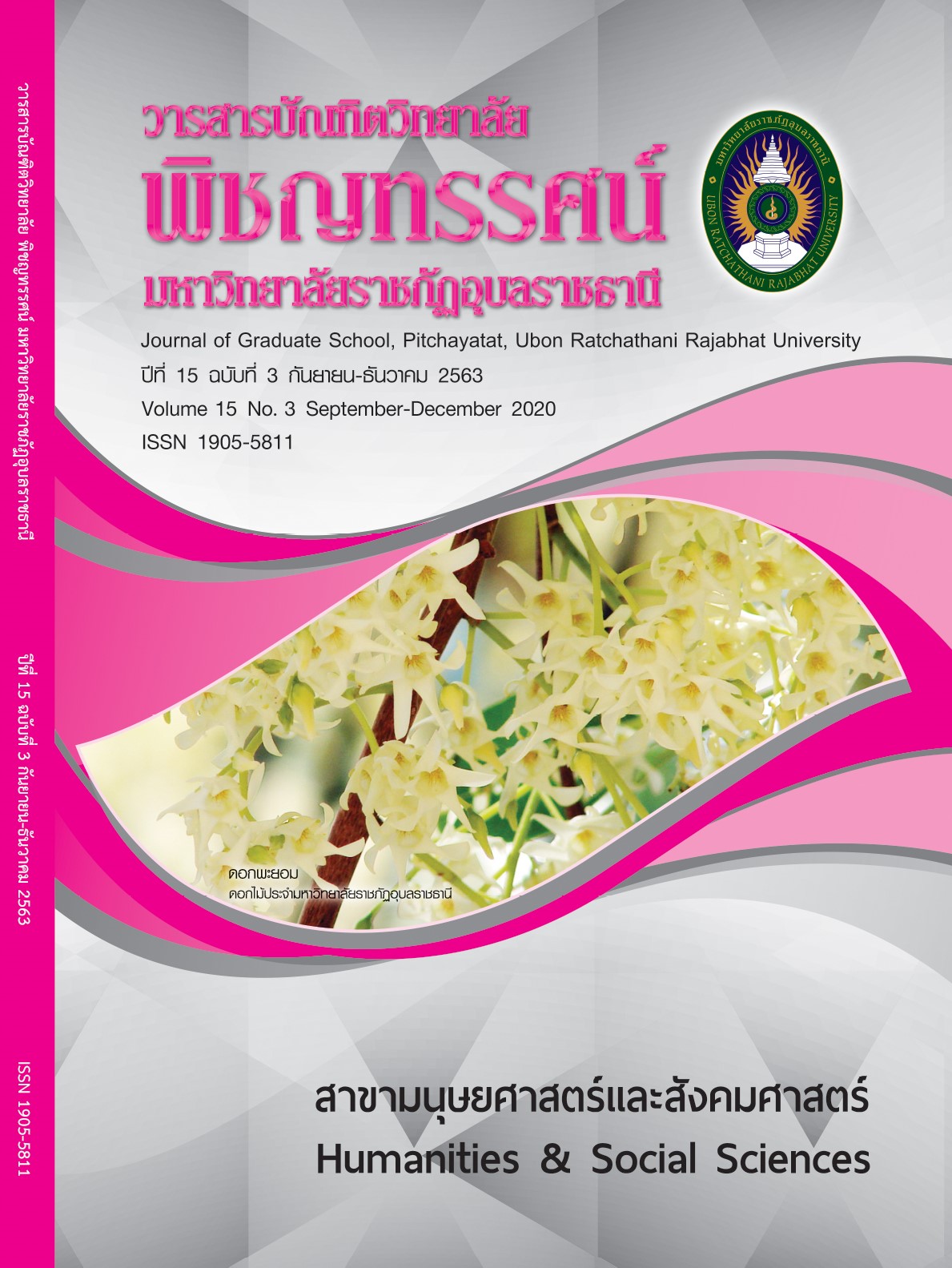การพัฒนารูปแบบองค์การแห่งการเรียนรู้ในศตวรรษที่ 21 สำหรับสถานศึกษาขนาดเล็ก ในสำนักงานศึกษาธิการภาค 13
คำสำคัญ:
: องค์การแห่งการเรียนรู้ , การเรียนรู้ในศตวรรษที่ 2 , สถานศึกษาขนาดเล็ก , สำนักงานศึกษาธิการ ภาค 13บทคัดย่อ
การวิจัยนี้มีมีวัตถุประสงค์เพื่อ 1) ศึกษาองค์ประกอบของรูปแบบองค์การแห่งการเรียนรู้ในศตวรรษที่ 21 สำหรับสถานศึกษาขนาดเล็กในสำนักงานศึกษาธิการภาค 13 2) วิเคราะห์และพัฒนารูปแบบองค์การแห่งการเรียนรู้ในศตวรรษที่ 21 สำหรับสถานศึกษาขนาดเล็กในสำนักงานศึกษาธิการภาค 13 และ 3) ประเมินรูปแบบองค์การแห่งการเรียนรู้ในศตวรรษที่ 21 สำหรับสถานศึกษาขนาดเล็กในสำนักงานศึกษาธิการภาค 13 การวิจัยนี้เป็นการวิจัยเชิงปริมาณและเชิงคุณภาพ โดยใช้กระบวนการวิจัยแบบวิจัยและพัฒนาการดำเนินการวิจัย แบ่งเป็น 3 ระยะ ได้แก่ ระยะที่ 1 การศึกษาเอกสารและงานวิจัยที่เกี่ยวข้อง ระยะที่ 2 การวิเคราะห์และพัฒนารูปแบบ และ ระยะที่ 3 การประเมินรูปแบบโดยการสัมภาษณ์ ตัวอย่าง จำนวน 313 แห่ง ผู้ให้ข้อมูลแบบสอบถาม คือ ผู้อำนวยการสถานศึกษา และครู จำนวน 939 สุ่มตัวอย่างแบบกลุ่ม เครื่องมือที่ใช้ในการวิจัยเป็นแบบสอบถาม และแบบสัมภาษณ์แบบมีโครงสร้าง สถิติที่ใช้ได้แก่ ร้อยละ ค่าเฉลี่ย ส่วนเบี่ยงเบนมาตรฐาน การหาค่า PNI และการวิเคราะห์ความเรียง
ผลการวิจัยพบว่า
รูปแบบองค์การแห่งการเรียนรู้ในศตวรรษที่ 21 สำหรับสถานศึกษาขนาดเล็กในสำนักงานศึกษาธิการภาค 13 ประกอบด้วย แนวคิดและหลักการ วัตถุประสงค์ และองค์ประกอบ 6 องค์ประกอบ ได้แก่ 1) การมีแรงจูงใจ 2) การมีโครงสร้างที่เหมาะสม 3) การมีบรรยากาศการทำงาน 4) การมีวิสัยทัศน์ร่วมของคนในองค์การ 5) การใช้เทคโนโลยี และ 6) การเรียนรู้เป็นทีม เป็นรูปแบบองค์การแห่งการเรียนรู้ที่ผู้ทรงคุณวุฒิได้ประเมินด้านความเหมาะสม ความเป็นไปได้ และเป็นประโยชน์ในการนำไปใช้ในระดับมากที่สุด
เอกสารอ้างอิง
กิตติชัย ไตรรัตนศิริชัย. “การพัฒนากำลังคนเพื่อขีดความสามารถในการแข่งขันของประเทศไทย ภายใต้โครงการวิจัยเรื่องกำหนดแนวทางการพัฒนาการศึกษาไทยกับการเตรียมความ พร้อมสู่ศตวรรษที่ 21,” กรุงเทพฯ: จุฬาลงกรณ์มหาวิทยาลัย, 2557.
ชัชวาล วงษ์ประเสริฐ. การจัดการองค์กร. กรุงเทพฯ: เอ็กซเปอร์เน็ท, 2548.
ธีระ รุญเจริญ. ความเป็นมืออาชีพในการจัดการและบริหารการศึกษายุคปฏิรูปการศึกษา. กรุงเทพฯ: ข้าวฟ่าง, 2550.
ธีระ รุญเจริญ. สู่ความเป็นผู้บริหารสถานศึกษามืออาชีพ. กรุงเทพฯ: ชุมทองอุตสาหกรรมและการพิมพ์จำกัด, 2553.
มหาวิทยาลัยสุโขทัยธรรมาธิราช. ประมวลสาระชุดวิชาทฤษฎีและแนวปฏิบัติในการบริหารการศึกษา. พิมพ์ครั้งที่ 4. นนทบุรี. มหาวิทยาลัยสุโขทัยธรรมาธิราช, 2552.
วรพจน์ วงศ์กิจรุ่งเรือง และอธิป จิตตฤกษ์. ทักษะแห่งอนาคตใหม่: การศึกษาเพื่อศตวรรษที่ 21. กรุงเทพฯ: โอเพ่นเวิลด์ส, 2554.
วิชัย วงษ์ใหญ่. “การพัฒนากำลังคนเพื่อขีดความสามารถในการแข่งขันของประเทศไทย ภายใต้โครงการวิจัยเรื่องกำหนดแนวทางการพัฒนาการศึกษาไทยกับการเตรียมความพร้อมสู่ศตวรรษที่ 21” ใน: กรุงเทพฯ: จุฬาลงกรณ์มหาวิทยาลัย, 2557.
วิโรจน์ สารรัตนะ. โรงเรียนองค์การแห่งการเรียนรู้ : แนวคิดทางการบริหารการศึกษา. พิมพ์ครั้งที่ 4. กรุงเทพฯ: ทิพยวิสุทธิ์, 2544.
วิโรจน์ สารรัตนะ. ผู้บริหารใหม่. กรุงเทพฯ: ทิพย์วิสุทธิ์, 2548.
วิโรจน์ สารรัตนะ. การบริหารการศึกษา : หลักการ ทฤษฎี หน้าที่ ประเด็น และบทวิเคราะห์. พิมพ์ครั้งที่ 4. กรุงเทพฯ: ทิพย์วิสุทธิ์, 2556.
สมาน อัศวภูมิ. การพัฒนารูปแบบการบริหารการประถมศึกษาระดับจังหวัด. วิทยานิพนธ์ครุศาสตร ดุษฎีบัณฑิต จุฬาลงกรณ์มหาวิทยาลัย, 2537.
สำนักงานคณะกรรมการการศึกษาขั้นพื้นฐาน. มาตรฐานสำนักงานเขตพื้นที่การศึกษา. กรุงเทพฯ: สำนักงานคณะกรรมการการศึกษาขั้นพื้นฐาน, 2551.
สุพรทิพย์ ธนภัทรโชติวัต. การพัฒนารูปแบบการจัดประสบการณ์วิชาชีพครูเพื่อส่งเสริมคุณลักษณะ ครูในทศวรรษที่ 21. วิทยานิพนธ์การศึกษาดุษฎีบัณฑิต มหาวิทยาลัยนเรศวร, 2557.
สุวิมล ว่องวานิช. การวิจัยปฏิบัติการในชั้นเรียน. พิมพ์ครั้งที่ 9. กรุงเทพฯ: สำนักพิมพ์แห่ง จุฬาลงกรณ์มหาวิทยาลัย, 2549.
สุวิมล ว่องวานิช. การวิจัยประเมินความต้องการจำเป็น. กรุงเทพฯ: สำนักพิมพ์แห่งจุฬาลงกรณ์มหาวิทยาลัย, 2558.
Alvin, Toffer. The Third Wave. New York: William Marrow, 1980.
Bardo, J. W. & Hardman, J.J. (1982). Urban Sociology: A systematic production. Chicago. F.E Peacock. Barnes, D.E. 1976.
Bellanca, J, and Brandt, R. 21st century skills: Rethinking How Students Learn. Solution Tree Press, 2010.
Cronbach, Lee J. Essentials of Psychological Testing. 5th ed. New York: Harper Collins,
Hoy W.K. and Miskel C.G. Educational Administration Theory. Research, and Practice.
Boston: Mc Graw-Hill, 2008.
Joyce, B., & Calhoun, E. Models of professional development: A celebration of
educators. Thousand Oaks. CA: Corwin Press, 2010.
Krejcie, R. V. and Morgan, D. W. Determining Sample Size for Research Activities. Educational and Psychological Measurement, 1970.
Marquarde, Michael J.; & Raynolds. A. The Global Learning Organization. New York: Irwin, 1994.
Marquardt and Raynolds. A. Building the Learning Organization : Mastering the S Elements for Corporate Learning. New York: McGraw – Hill, 1996.
ดาวน์โหลด
เผยแพร่แล้ว
รูปแบบการอ้างอิง
ฉบับ
ประเภทบทความ
สัญญาอนุญาต
บทความทุกเรื่องได้รับการตรวจความถูกต้องทางวิชาการโดยผู้ทรงคุณวุฒิภายนอกอย่างน้อย 3 คน ความคิดเห็นในวารสารพิชญทรรศน์เป็นความคิดเห็นของผู้นิพนธ์มิใช่ความคิดเห็นของผู้จัดทำ จึงมิใช่ความรับผิดชอบของวารสารพิชญทรรศน์ และบทความในวารสารพิชญทรรศน์สงวนสิทธิ์ตามกฎหมายไทย การจะนำไปเผยแพร่ต้องได้รับอนุญาตเป็นลายลักษณ์อักษรจากกองบรรณาธิการ





